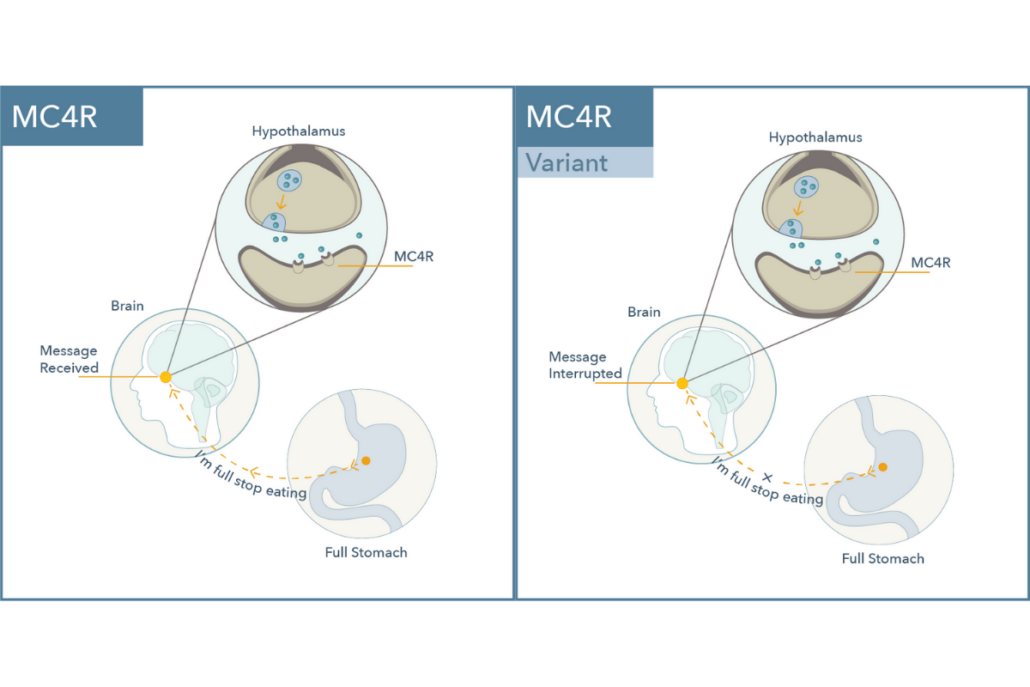The Melanocortin 4 Receptor (MC4R) is a receptor found in the hypothalamus and involved in the regulation of satiety, food intake, and energy expenditure. Specifically, two main signals from the body are propagated via MC4R: anorexigenic signals and orexigenic signals. Anorexigenic signals promote satiety, resulting in decreased food intake and increased energy expenditure, while orexigenic signals promote energy intake and storage. Gene variations in MC4R may cause receptor desensitization and have been associated with leptin resistance, insulin resistance, binge eating, food-seeking behavior, excessive hunger, and obesity.

Genome-wide association studies (GWAS) have identified a significant association between the minor (A) allele and increased risk for antipsychotic induced weight gain (AIWG). One of these studies included a pharmacogenetic association analysis of their discovery patient cohort, and found that patients with the homozygote risk genotype (A/A) gained significantly more weight over a 12-week trial of various second generation antipsychotics than either heterozygotes (C/A) or common allele homozygotes (C/C). The latter two groups did not significantly differ from one another. The authors of this study then repeated this analysis across three additional independent cohorts and replicated their initial results, indicating a marked increase of AIWG in A/A homozygotes.

Adapted from Malhotra et al (2012) Association between common variants near the melanocortin 4 receptor gene and severe antipsychotic drug-induced weight gain. Arch Gen Psychiatry.
Consideration of the metabolic consequences of second generation antipsychotics is important, as they are associated with decreased compliance and long-term morbidity from conditions such as obesity, dyslipidemia, diabetes and cardiovascular disease. Second generation antipsychotics can be stratified according to their metabolic risk.
-
- High risk: olanzapine and clozapine
- Medium risk: aripiprazole, brexpiprazole, iloperidone, olanzapine/samidorphan, paliperidone, quetiapine, and risperidone
- Lower risk: asenapine, cariprazine, lumateperone, lurasidone, and ziprasidone
For patients with a homozygote risk MC4R genotype (A/A), consideration of lower weight gain risk treatment options may be considered. This pharmacogenetic information may also prompt a clinician to consider weight gain mitigation options such as metformin (if clinically appropriate).
Are You Ready to Upgrade Your Practice with Genomind?
Genomind’s pharmacogenetic testing is the most advanced and comprehensive mental health pharmacogenetic test available. Get access to 26 genes related to mental health, 130+ medications, 10+ conditions, state-of-the-art tools, and 360 degrees of support today!
References
- Cole SA, Butte NF, Voruganti VS, et al. Evidence that multiple genetic variants of MC4R play a functional role in the regulation of energy expenditure and appetite in Hispanic children. Am J Clin Nutr. 2010;91(1):191-199. doi:10.3945/ajcn.2009.28514
- do Carmo JM, da Silva AA, Dubinion J, et al. Control of metabolic and cardiovascular function by the leptin-brain melanocortin pathway. IUBMB Life. 2013;65(8):692-698.
- Spiegelman BM, Flier JS. Obesity and the regulation of energy balance. Cell. 2001;104(4):531-543.
- Haynes WG, Morgan DA, Djalali A, Sivitz WI, Mark AL. Interactions between the melanocortin system and leptin in control of sympathetic nerve traffic. Hypertension. 1999;33(1 Pt 2):542-547.
- Yilmaz Z, Davis C, Loxton NJ, et al. Association between MC4R rs17782313 polymorphism and overeating behaviors. Int J Obes (Lond). 2015;39(1):114-120. doi:10.1038/ijo.2014.79
- Czerwensky F, Leucht S, Steimer W. MC4R rs489693: a clinical risk factor for second generation antipsychotic-related weight gain? Int J Neuropsychopharmacol. 2013;16(9):2103-2109.
- Malhotra AK, Correll CU, Chowdhury NI, et al. Association between common variants near the melanocortin 4 receptor gene and severe antipsychotic drug-induced weight gain. Arch Gen Psychiatry. 2012;69(9):904-912.
- Newcomer JW. Second-generation (atypical) antipsychotics and metabolic effects: a comprehensive literature review. CNS Drugs. 2005;19 Suppl 1:1-93.
- Jiang, W., Cai, D., Yin, F. et al. Adjunctive metformin for antipsychotic-induced dyslipidemia: a meta-analysis of randomized, double-blind, placebo-controlled trials. Transl Psychiatry 10, 117 (2020).
- Maayan L, Vakhrusheva J, Correll CU. Effectiveness of medications used to attenuate antipsychotic-related weight gain and metabolic abnormalities: a systematic review and meta-analysis. Neuropsychopharmacology. 2010;35(7):1520-1530.
